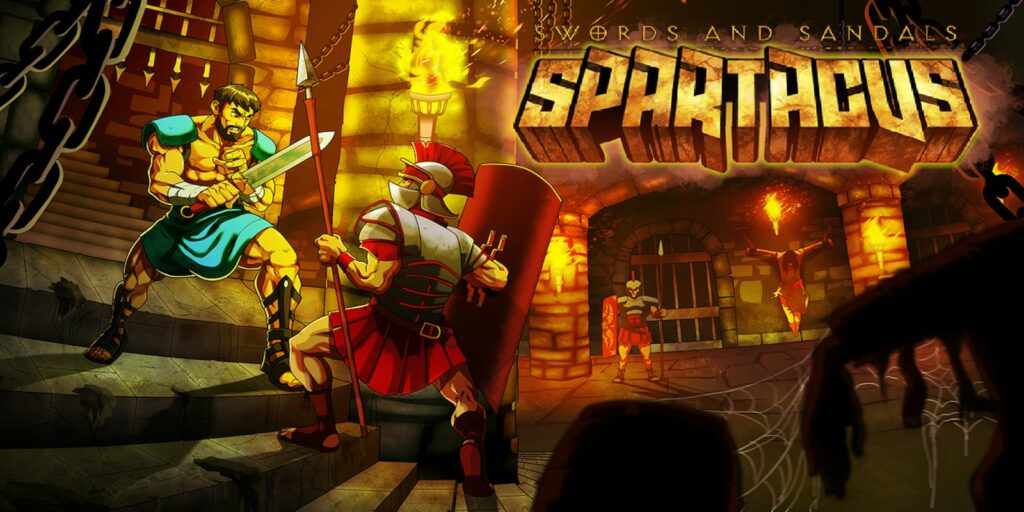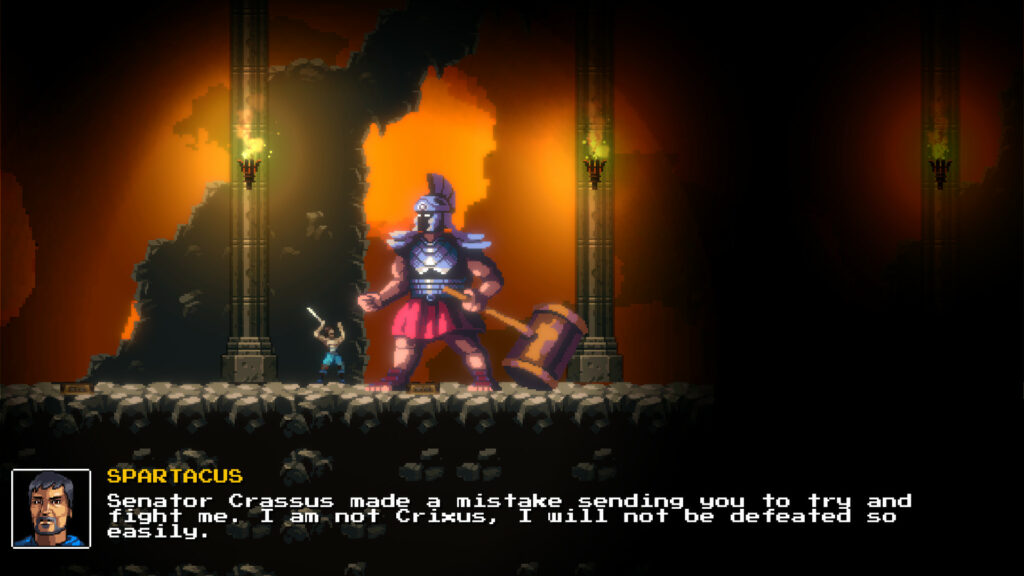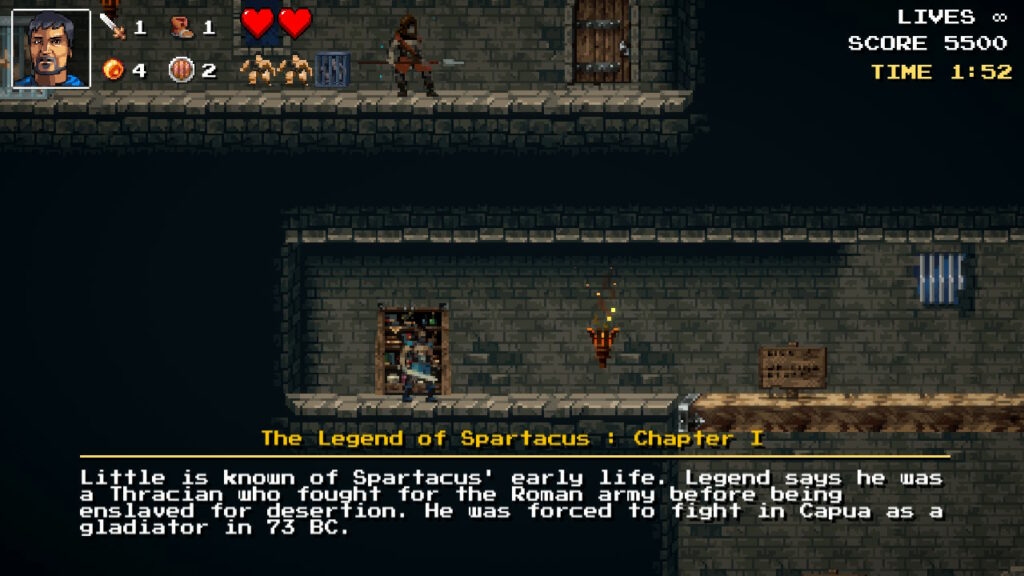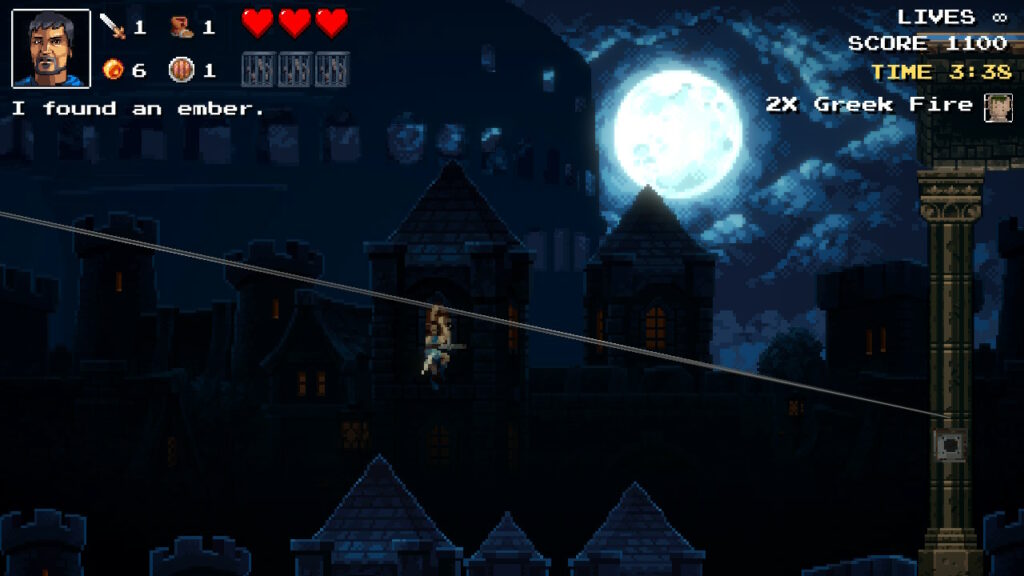
Developer: Whiskeybarrel Studios
Publisher: Ultimate Games
Platform: Switch, PC
Tested on: Switch
Swords and Sandals: Spartacus – Review
If you’re not familiar with the Swords and Sandals series, you might be surprised to learn that this is already the 10th entry in a franchise that’s been a mainstay since 2006. Apart from the mention of the franchise name in the title and the gladiatorial theme, however, there’s not a lot that connects Spartacus to other entries in the series. As a result, we’re looking at Oliver Joyce’s latest brainchild as a standalone game rather than a sequel. So how does it hold up?
Story
Chances are you’re already familiar with the core story of Spartacus, either through the classic Kirk Douglas film or the TV series. Swords and Sandals: Spartacus follows the same basic premise, although it’s not connected to any previous on-screen depictions of the character. Not a lot is known about the historical figure of Spartacus and every interpretation shows some form of artistic liberty. A very short cutscene explains how this version of the story puts us in 73 BC, where Thracian gladiator Spartacus makes a daring escape with the help of some of his friends. After escaping from the Ludus where these gladiators are held, Spartacus goes on a quest to free other gladiators. Their ultimate goal is an uprising to overthrow the powers that rule Rome.
Graphics
Unlike previous entries in the Swords and Sandals series, which features crudely drawn cartoon gladiators, Spartacus makes use of a more realistic style. The 16-bit graphics look arguably much better than the game’s ancestors. You’re especially in for a treat if you’re a fan of this retro style, as it is one of the prettier 16-bit looking games we’ve seen recently. It isn’t the most graphically demanding game on the Switch, so we didn’t expect any graphical performance issues, and we’re happy to confirm that everything runs smooth as butter here.
One thing that we should point out is the plethora of filters that are available. There’s the obligatory CRT filter, which a lot of faux-retro games use these days but we were surprised to see an oil painting style filter as well as a 50s monitor filter here. We understand the idea behind having Spartacus look like a classical painting, but we do question the significance of some of the other filter styles.
Sound
Any gladiator themed game worth its salt should have a suitably epic soundtrack, and Spartacus delivers a commendable effort. It’s obvious that the music is completely computer-generated instead of fully orchestrated, which makes sense given the likely limited budget but what is offered musically does the job well enough. One thing that puzzled us was the voice acting: although the cutscenes are devoid of any kind of vocal sounds, there’s still limited voice acting present in the game. A gravelly voice keeps shouting soundbytes at us at the start and end of each level, such as “YOU ARE SPARTACUS!”. These seemed very out of place and got repetitive and annoying after a while.
Gameplay
Although Spartacus is technically the 10th entry in the long-running Swords and Sandals franchise, the difference between Swords and Sandals I and Swords and Sandals: Spartacus couldn’t be bigger if it tried. Whereas the first game focused on arena-based combat with cartoony graphics, Spartacus offers an action-arcade platformer that feels decidedly more serious. Stepping in the sandals of the titular Spartacus, players are tasked with fighting their way through ancient Rome, freeing gladiators along the way in order to build up an army to rise up against the ruling class. Spartacus attempts to solidify itself as a stand-out experience by pulling out all the stops. Think of any mechanic you’ve encountered in a platform game, and chances are that it’s been implemented in Spartacus in some form or another.
The levels themselves are filled with secret pathways, hidden treasure and many, many ways to die. Apart from the variety of enemies that are more than happy to send you to an early game and the plethora of traps and other obstacles, you’ll also have to keep in mind that there is a timer slowly counting down. Given that there are hidden rooms and multiple pathways in each level, you’re unlikely to be able to explore a level completely in a single run, improving replayability as you attempt to figure out the best route towards the exit. The levels themselves are fairly challenging affairs, and the game offers up several difficulty levels, although the difficulty seems to be just in limiting the number of lives that you get, with the easiest setting offering infinite respawns.
Combat is a fairly straightforward affair. Spartacus is armed with a sword and a shield, and the shield will automatically absorb a number of non-instakill hits before it breaks. Killing enemies is as easy as repetitively slashing at them with your sword, although hitboxes appear slightly inaccurate. Additionally, you’ll be able to find ranged weapons scattered throughout the levels. Your combat prowess can be upgraded as well: after each level, you’ll be rewarded treasure based on your performance, which can in turn be used to upgrade your stats. It’s a pretty straightforward approach and since you can prioritize which stats or abilities you want to upgrade, it allows you to customize Spartacus to suit your playstyle.
We’d call the mechanics listed so far a more than solid enough base for a decent platformer, but Spartacus keeps piling on more stuff. If you collect 10 embers, for example, you’ll be invincible for a while, similar to power stars in the Mario series. There are the aforementioned gladiators scattered throughout the levels that you’ll need to free. There’s the option to destroy checkpoints in exchange for bonus treasure. And that’s before we’re even getting to the hidden keys that you can collect to open a door on the other side of the level to reap rewards -all while outrunning the timer of course. There are even collectible “history” books that offer information on Spartacus, though the timer does not pause while you’re reading these. It’s a lot to take in and we feel that Spartacus would have been a better game if it were more streamlined, and dropped the majority of these extraneous mechanics in exchange for a tighter control scheme and more accurate hitboxes.
Conclusion
Spartacus is one of the better entries in Ultimate Games’ stable of Switch releases, although, given the publisher’s track record, that’s not saying much. Given Spartacus’ Roman origins, it feels both accurate and suitable to compare it to a fancy pizza: it’s quite good, but it could’ve done without the extravagant toppings.
Swords and Sandals: Spartacus - Review,








No Comments